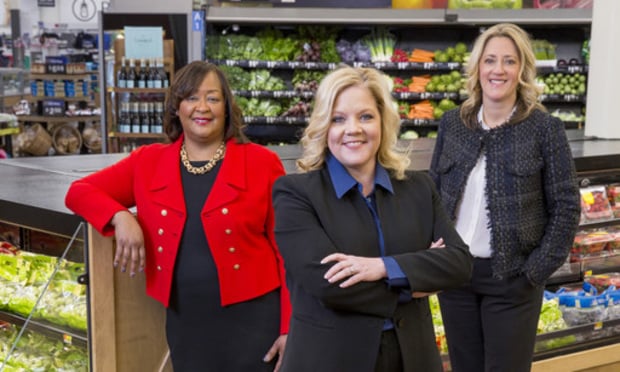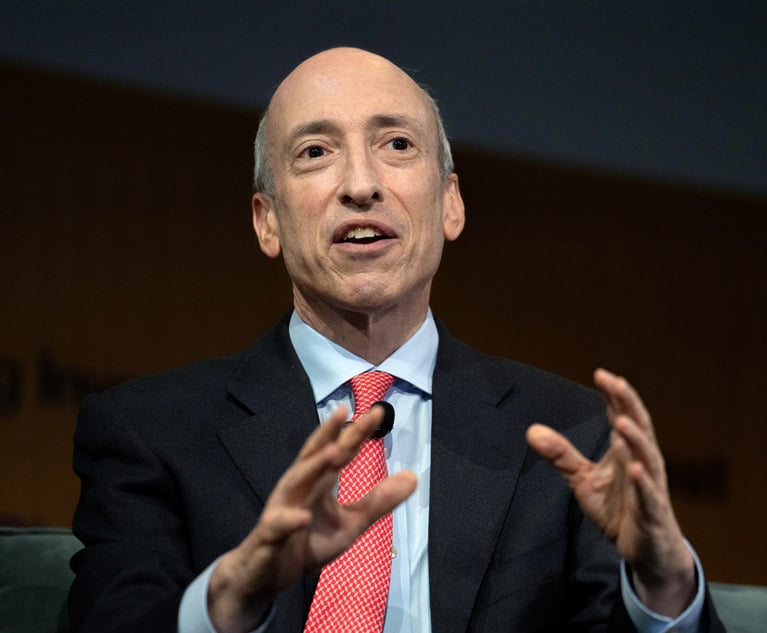Walmart: Where Women Lead
Walmart's legal department has become a model for other companies looking to fill their ranks with more women and members of other underrepresented groups.
April 02, 2018 at 07:00 AM
6 minute read
 Phyllis Harris, SVP and General Counsel Legal Operations Walmart Stores, Inc., left, Karen Roberts, Executive Vice President and General Counsel, Walmart Stores, Inc., center, and Kerry Kotouc, Sam''s Club General Counsel, Asset Protection and Compliance, right, stand in the produce section of a Walmart Supercenter on Monday, February 26, 2018, in Rogers, Ark. Photo: Beth Hall
Phyllis Harris, SVP and General Counsel Legal Operations Walmart Stores, Inc., left, Karen Roberts, Executive Vice President and General Counsel, Walmart Stores, Inc., center, and Kerry Kotouc, Sam''s Club General Counsel, Asset Protection and Compliance, right, stand in the produce section of a Walmart Supercenter on Monday, February 26, 2018, in Rogers, Ark. Photo: Beth Hall Walmart Inc. general counsel Karen Roberts can remember the company's legal department around 1998. It had about 28 lawyers, and only a few were women. She recalls there was one female vice president and general counsel of a Walmart division.
Walmart says exact legal department statistics are not available for those years. But it wasn't hard to see why women employees filed a landmark class action lawsuit against the Bentonville, Arkansas-based company in 2001, on behalf of 1.6 million current or former female employees who alleged gender discrimination in pay and promotion policies. Ten years later the U.S. Supreme Court dismissed the suit on technical grounds without ruling on the merits.
The world's largest retailer didn't wait on the Supreme Court decision to take action. It embarked on a diversity journey that makes Walmart—especially its legal department—a model for other companies looking to fill their ranks with more women and members of other underrepresented groups.
The company joined the 2005 diversity “Call to Action” by Fortune 100 general counsel. That year Walmart reported on its diversity growth—42 percent of its in-house attorneys were now women, and 26 percent were minorities. Half the officers in the legal department were women and minorities.
And the growth continues. Today Roberts says the legal department has 157 in-house attorneys, of whom 46 percent are women and 28 percent are people of color. In addition, five of the 13 division general counsel are women, including two women of color.
Roberts, along with chief ethics and compliance officer Jay Jorgensen, reports to a woman. On Feb. 9 Walmart named Rachel Brand, formerly the No. 3 official at the U.S. Department of Justice, as head of global governance and corporate secretary.
The latest statistics from the Minority Corporate Counsel Association showed that 132 of the Fortune 500 companies had women general counsel, amounting to a little over 26 percent. Numbers were not available for percentage of women lawyers in legal departments more generally.
It's a safe bet that Walmart is near the top nationally on law department diversity, but Roberts insists, “It's not just about the numbers.” She says it is more about building a team that better reflects the customer population, while helping employees achieve their full potential regardless of gender or race.
“There's still more work to be done,” she adds. “We want to focus on creating a pipeline of talent and creating interest among young men and women and people of color in the legal profession.”
The company also offers employee support groups for numerous minorities, including Native Americans, disabled persons and LGBT employees.
But Walmart's diversity work reaches well beyond its own legal department. In 2005 the company made headlines when it told its top 100 law firms that it would limit or end its relationship with them if they failed to demonstrate “a meaningful interest in the importance of diversity.” After talking with the law firms about ways they could improve their standing, the company ended its relationship with two that didn't want to meet expectations.
Walmart has since developed an internal general counsel dashboard to provide transparency around outside law firm spend, including statistics on work allocation and diversity by matter and by firm. In addition, Walmart has now expanded its diversity expectations to all suppliers, not just legal ones.
The company also works closely with and donates to about a dozen women and minority lawyer groups, such as the National Bar Association or the National Association of Women Lawyers. Since 2016 Walmart has contributed more than $7 million to these groups, and it sends representatives to their conferences to network with attendees.
Angela Brandt knows firsthand how Walmart's clout can help a woman lawyer's career. Brandt is a partner at Larson King, a St. Paul litigation boutique of about 35 lawyers. As an associate, she met a Walmart representative at a NAWL event and was invited to take part in the company's Walmart Ready program.
The program lets participants “look behind the curtain and gain a better understanding of how the legal department is structured and how it works,” Brandt says. The attendees also meet in person with various Walmart lawyers who are in charge of the type of work outside counsel do.
Walmart networked with Brandt and offered her some work, and when she did well, the company gave her more. Her Walmart contact also reached out to the executive committee of her firm to say she was “doing great work and was a valuable member of their team.”
Bottom line: Brandt booked enough new business that she made equity partner.
“Walmart is committed to diversity in the legal profession in a way that goes beyond just the appearance, beyond just giving money to organizations,” says Brandt, who serves as NAWL president this year. “They take the extra steps.”
Joel Stern, president of the National Association of Minority & Women Owned Law Firms, agrees. Stern says Walmart's programs work because the company has made diversity part of its core values. “It's not just a hobby for them,” he says. “They treat it like any other strategic imperative.”
Walmart helps sponsor NAMWOLF financially, has a representative on its board and serves on its in-house advisory council. Under one NAMWOLF partner program, corporations such as Walmart give at least 5 percent of their outside counsel budget to minority- and women-owned law firms. In seven years, Stern says 32 companies have given over $1 billion.
He says Walmart has gone beyond figuring out diversity and has added the “inclusive” aspect, because the company knows how to embrace a mix of people and make everybody feel they belong. “Walmart is at the top of my list of who to look at and model your program after,” Stern says. “They have figured out how to make it part of what they breathe every day.”
This content has been archived. It is available through our partners, LexisNexis® and Bloomberg Law.
To view this content, please continue to their sites.
Not a Lexis Subscriber?
Subscribe Now
Not a Bloomberg Law Subscriber?
Subscribe Now
NOT FOR REPRINT
© 2025 ALM Global, LLC, All Rights Reserved. Request academic re-use from www.copyright.com. All other uses, submit a request to [email protected]. For more information visit Asset & Logo Licensing.
You Might Like
View All
Am Law 100 Partners on Trump’s Short List to Replace Gensler as SEC Chair
4 minute read


Trending Stories
- 1Judge Sides with Retail Display Company in Patent Dispute Against Campbell Soup, Grocery Stores
- 2Is It Time for Large UK Law Firms to Begin Taking Private Equity Investment?
- 3Federal Judge Pauses Trump Funding Freeze as Democratic AGs Launch Defensive Measure
- 4Class Action Litigator Tapped to Lead Shook, Hardy & Bacon's Houston Office
- 5Arizona Supreme Court Presses Pause on KPMG's Bid to Deliver Legal Services
Who Got The Work
J. Brugh Lower of Gibbons has entered an appearance for industrial equipment supplier Devco Corporation in a pending trademark infringement lawsuit. The suit, accusing the defendant of selling knock-off Graco products, was filed Dec. 18 in New Jersey District Court by Rivkin Radler on behalf of Graco Inc. and Graco Minnesota. The case, assigned to U.S. District Judge Zahid N. Quraishi, is 3:24-cv-11294, Graco Inc. et al v. Devco Corporation.
Who Got The Work
Rebecca Maller-Stein and Kent A. Yalowitz of Arnold & Porter Kaye Scholer have entered their appearances for Hanaco Venture Capital and its executives, Lior Prosor and David Frankel, in a pending securities lawsuit. The action, filed on Dec. 24 in New York Southern District Court by Zell, Aron & Co. on behalf of Goldeneye Advisors, accuses the defendants of negligently and fraudulently managing the plaintiff's $1 million investment. The case, assigned to U.S. District Judge Vernon S. Broderick, is 1:24-cv-09918, Goldeneye Advisors, LLC v. Hanaco Venture Capital, Ltd. et al.
Who Got The Work
Attorneys from A&O Shearman has stepped in as defense counsel for Toronto-Dominion Bank and other defendants in a pending securities class action. The suit, filed Dec. 11 in New York Southern District Court by Bleichmar Fonti & Auld, accuses the defendants of concealing the bank's 'pervasive' deficiencies in regards to its compliance with the Bank Secrecy Act and the quality of its anti-money laundering controls. The case, assigned to U.S. District Judge Arun Subramanian, is 1:24-cv-09445, Gonzalez v. The Toronto-Dominion Bank et al.
Who Got The Work
Crown Castle International, a Pennsylvania company providing shared communications infrastructure, has turned to Luke D. Wolf of Gordon Rees Scully Mansukhani to fend off a pending breach-of-contract lawsuit. The court action, filed Nov. 25 in Michigan Eastern District Court by Hooper Hathaway PC on behalf of The Town Residences LLC, accuses Crown Castle of failing to transfer approximately $30,000 in utility payments from T-Mobile in breach of a roof-top lease and assignment agreement. The case, assigned to U.S. District Judge Susan K. Declercq, is 2:24-cv-13131, The Town Residences LLC v. T-Mobile US, Inc. et al.
Who Got The Work
Wilfred P. Coronato and Daniel M. Schwartz of McCarter & English have stepped in as defense counsel to Electrolux Home Products Inc. in a pending product liability lawsuit. The court action, filed Nov. 26 in New York Eastern District Court by Poulos Lopiccolo PC and Nagel Rice LLP on behalf of David Stern, alleges that the defendant's refrigerators’ drawers and shelving repeatedly break and fall apart within months after purchase. The case, assigned to U.S. District Judge Joan M. Azrack, is 2:24-cv-08204, Stern v. Electrolux Home Products, Inc.
Featured Firms
Law Offices of Gary Martin Hays & Associates, P.C.
(470) 294-1674
Law Offices of Mark E. Salomone
(857) 444-6468
Smith & Hassler
(713) 739-1250






